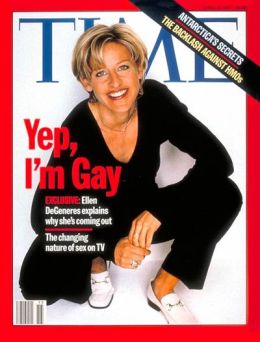
While being gay was accepted in mainstream culture, for those in the public eye, coming out was still seen as risky. And for someone as subject to public scrutiny as Ellen DeGeneres, the revelation wasn’t to be taken lightly. So she didn’t. DeGeneres, a comedian and star of then hit TV show Ellen, very publicly splashed it across the cover of TIME, timed to coincide with her character’s coming-out on her sitcom. TIME’s cover story shed light on her decision, revealing how her character wouldn’t be immediately comfortable yet with her sexuality, in contrast to other loud-and-proud gay characters of the era. The issue also featured an interview with DeGeneres about her sexual orientation, leaving little subtext. The first question from TIME’s Michael Krantz: “So, for the record, are you yourself gay?” to which DeGeneres responded “Yes.”
All this comes at a time when television is subject to greater scrutiny than ever before — dating back, at least, to then Vice President Dan Quayle’s famous 1992 speech in which he lambasted the character Murphy Brown for choosing to have a child out of wedlock. One can endlessly debate the question of whether television influences society or reflects it: Does Ellen Morgan’s coming out in what is still our massest medium legitimize homosexuality, or does the sponsorship of a bottom-line business like ABC merely reflect its acceptance by a significant portion of the population?





